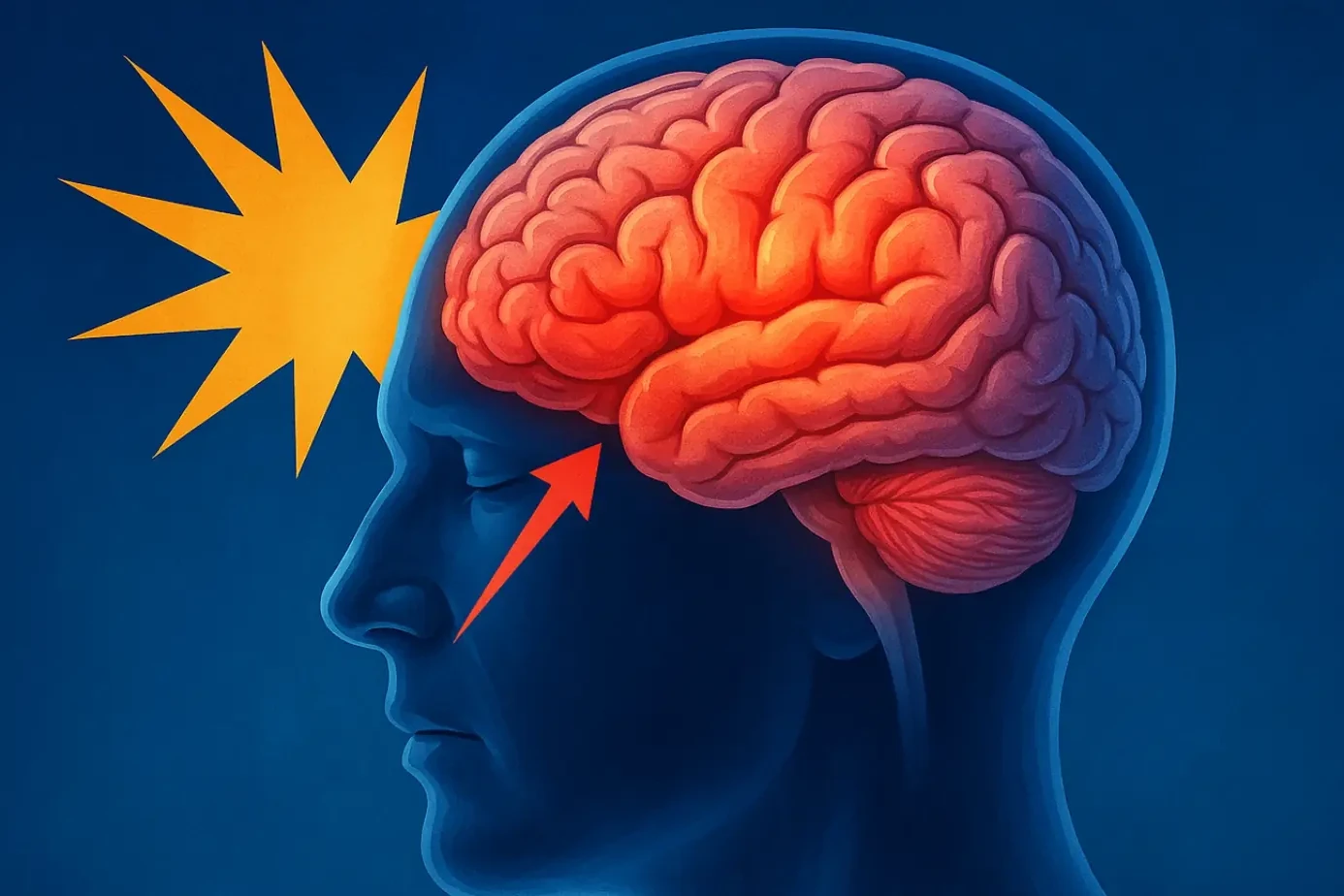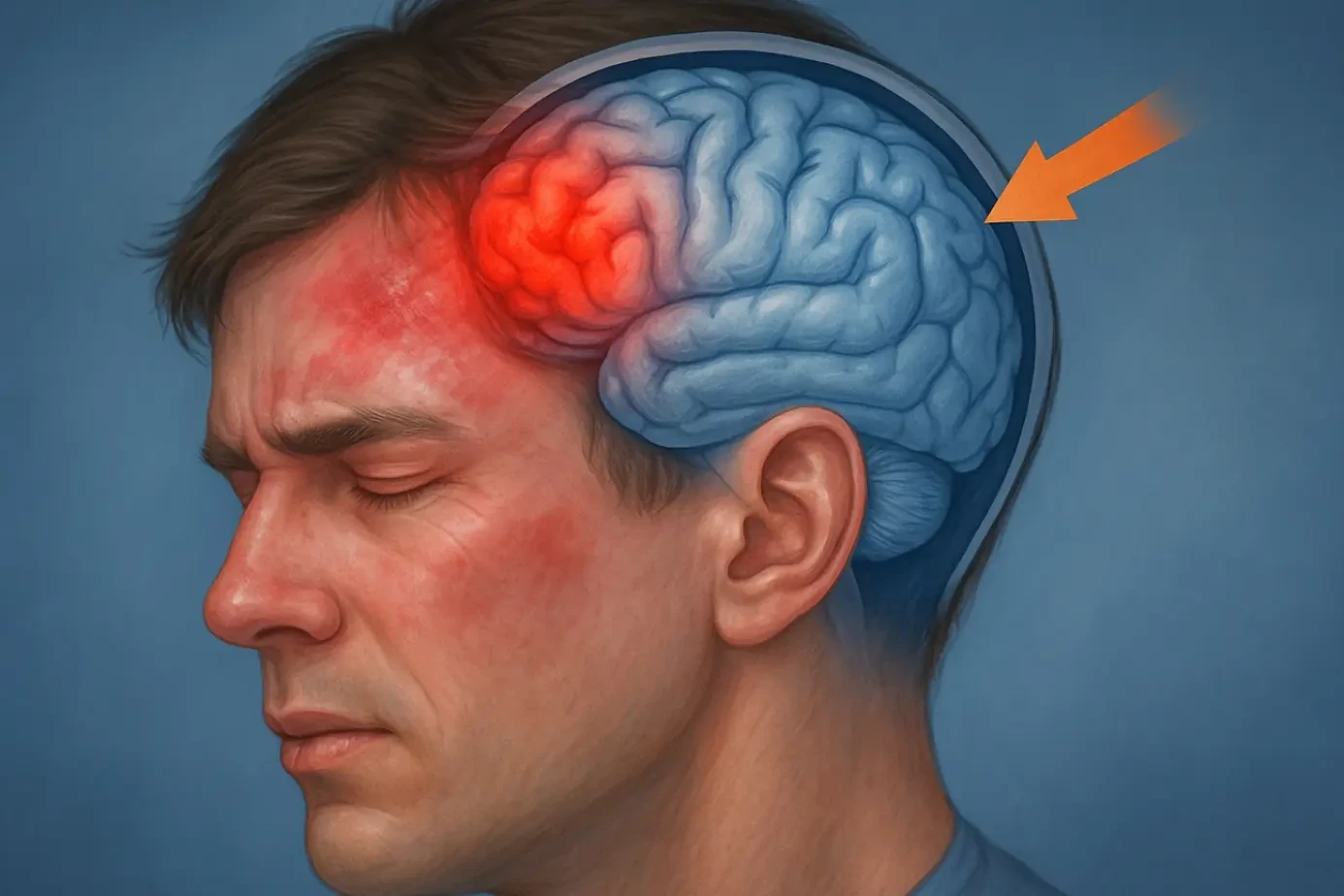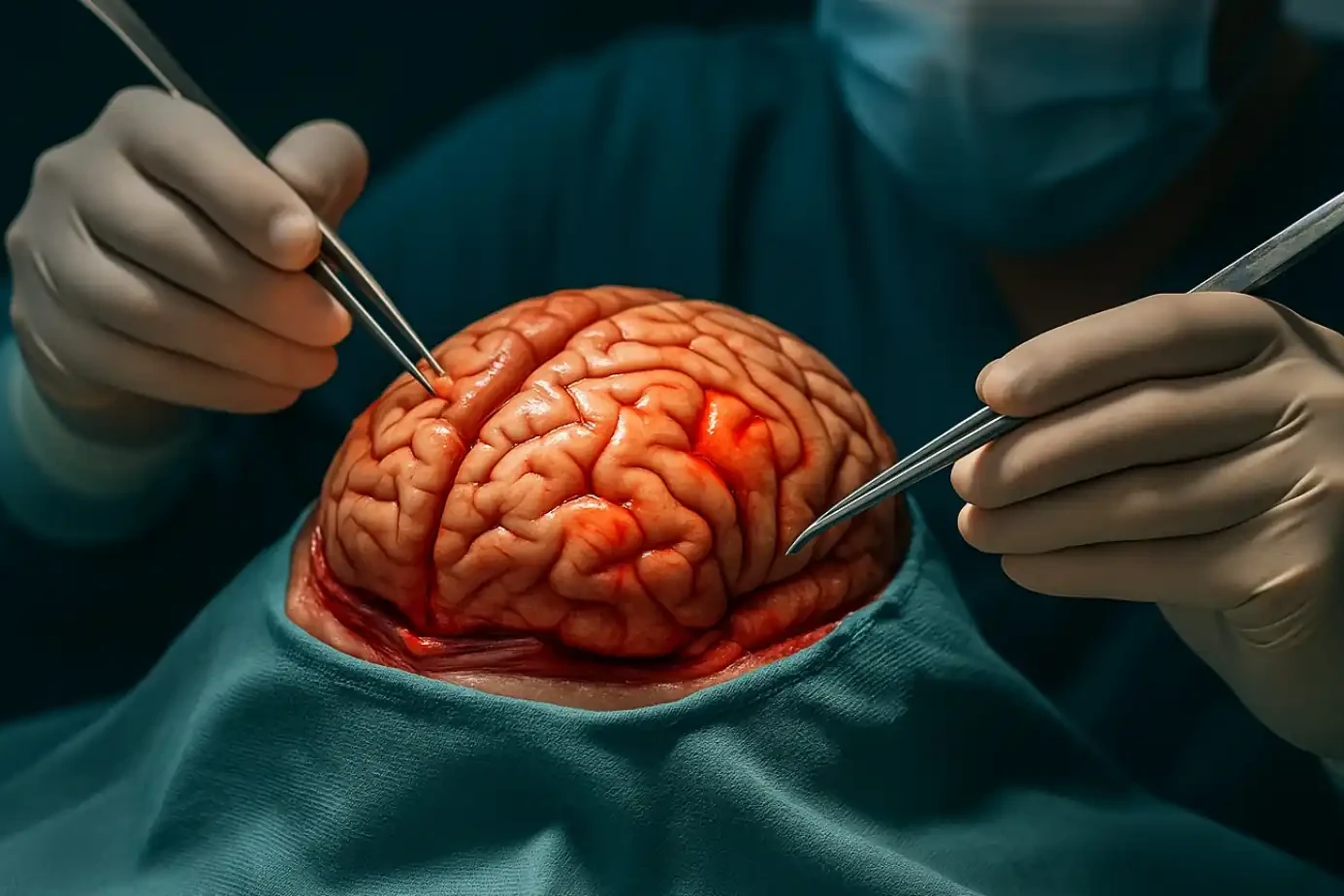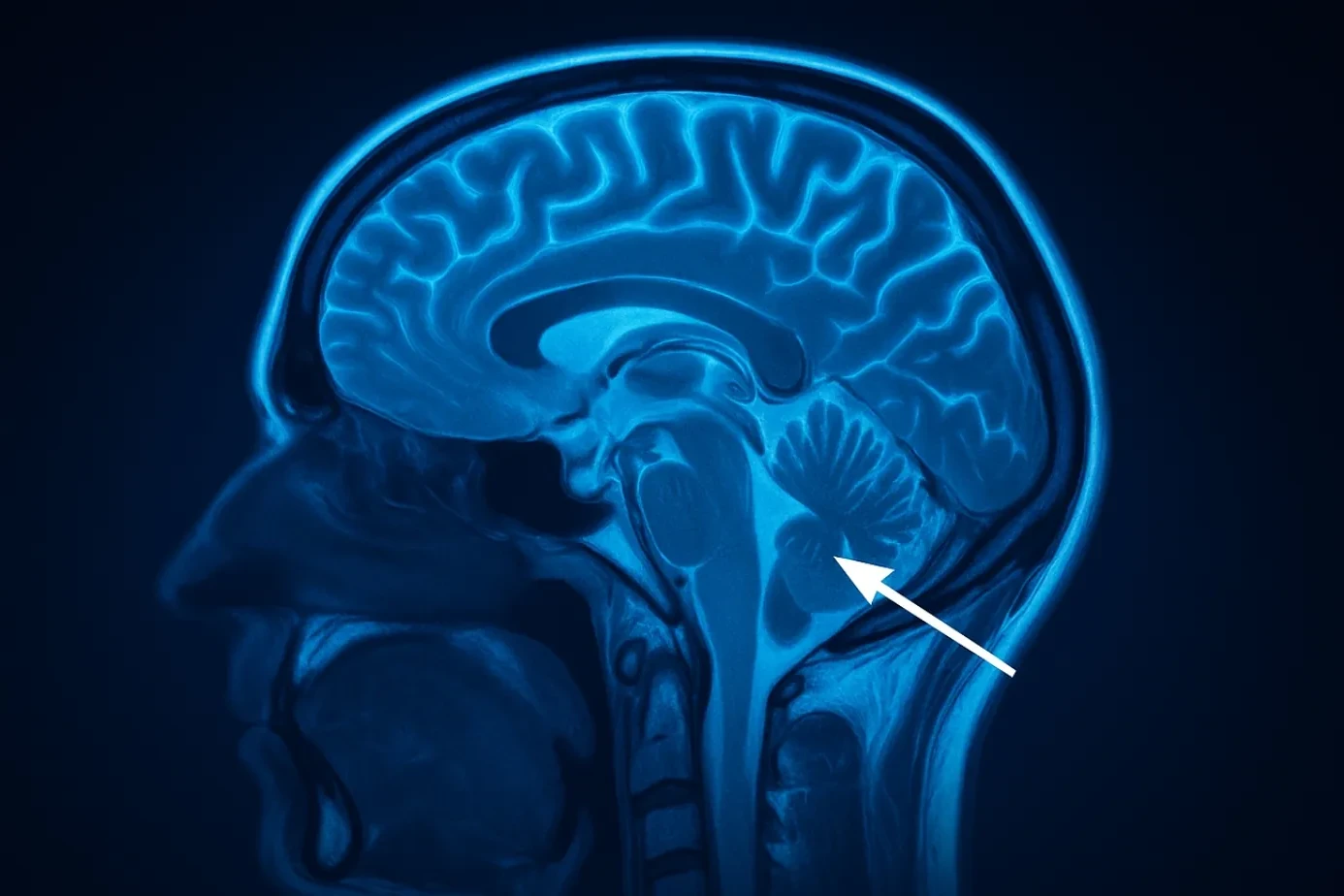Encephalitis refers to a serious medical condition characterized by swelling of the brain. When brain tissue becomes inflamed, it affects how the brain works, leading to dangerous symptoms such as fever, seizures, and confusion.
While it can occur in anyone, it’s most risky for children, older adults, and people with weak immunity. The causes range from infections to the body’s own immune system attacking itself.
Early detection and quick encephalitis treatment make a major difference in recovery.
Table of Contents
ToggleWhat are the symptoms of encephalitis?
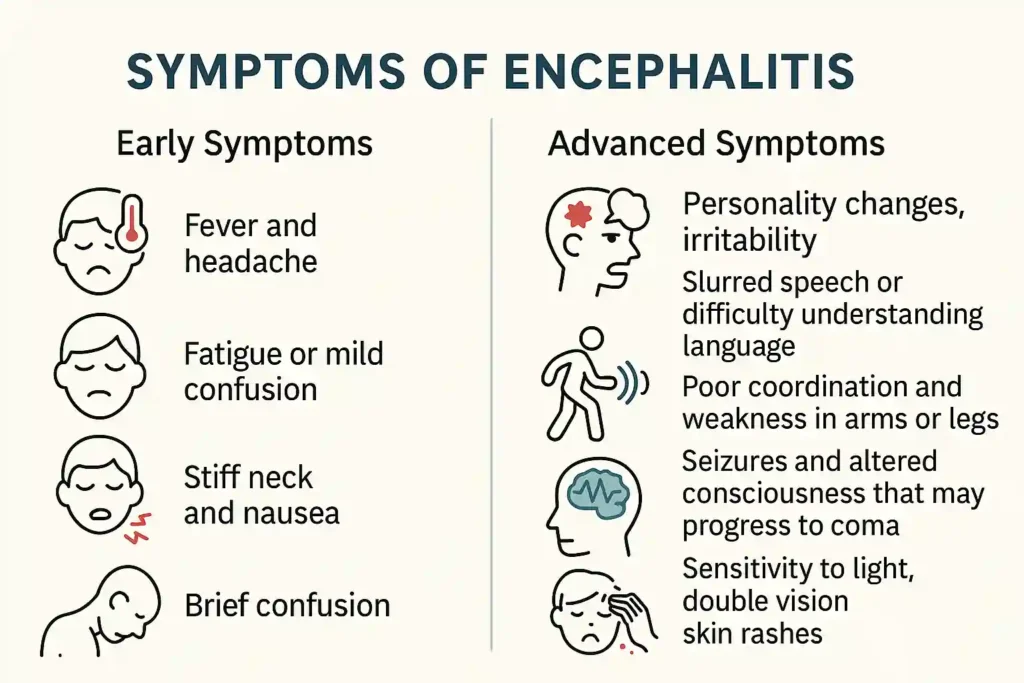
Recognizing encephalitis symptoms early is critical. In the beginning, they may look like common flu, but as the brain swells, the signs become severe.
Early symptoms:
- Fever and headache
- Fatigue or mild confusion
- Stiff neck and nausea
Advanced symptoms:
- Personality changes, irritability, or strange behavior
- Slurred speech or difficulty understanding language
- Poor coordination and weakness in arms or legs
- Seizures and altered consciousness that may progress to coma
Some patients also develop skin rashes (in viral infections), sensitivity to bright light, or double vision. In newborns, symptoms may include constant crying, poor feeding, and soft spot bulging.
What causes encephalitis?
Doctors describe what is encephalitis of the brain as a condition caused by infections, post-infection complications, or autoimmune reactions. Let’s look at the main triggers.
Common viruses
Viruses are the most frequent cause. The leading one is herpes simplex encephalitis, which mainly attacks the temporal lobes, damaging memory and speech centers. If untreated, it has high death rates.
Other common viruses include:
- Enteroviruses that spread through contaminated food and water.
- Epstein-Barr virus linked to mononucleosis.
- Cytomegalovirus, often dangerous in immunocompromised patients.
Childhood viruses
Diseases that used to be common in children can also cause encephalitis. Thanks to vaccines, the rates have dropped, but outbreaks still occur:
- Measles can lead to post-infectious neuroinflammation weeks after recovery.
- Mumps can inflame both the salivary glands and the brain.
- Rubella can affect both the nervous system and pregnancy outcomes.
- Varicella (chickenpox) can rarely progress to brain swelling.
Arboviruses
These insect-borne viruses spread by mosquitoes or ticks can cause outbreaks in specific regions:
- West Nile virus causes flu-like illness but can advance to severe brain swelling.
- In Asia, Japanese encephalitis is a prominent cause of illness, associated with high rates of mortality.
- The Zika virus, while generally mild in adults, can lead to birth defects and inflammation of the brain.
- Tick-borne encephalitis is found in parts of Europe and Russia.
What are the risk factors for encephalitis?
Although anyone can develop encephalitis, certain risk factors can increase the likelihood:
- Age: Infants and adults above 60 have weaker defenses.
- Immunity: Patients with HIV, cancer, organ transplants, or those on immune-suppressing drugs are more vulnerable.
- Geography: Living in mosquito- or tick-infested areas raises chances of arbovirus spread.
- Vaccination gaps: Lack of vaccines against measles, mumps, and rubella increases risk.
- Season: Mosquito-borne outbreaks often occur during rainy or warm seasons.
How is encephalitis diagnosed?
When doctors suspect what is encephalitis, quick testing is vital to start the right treatment. Several tools are used:
Spinal tap or lumbar puncture
In a lumbar puncture, a needle draws cerebrospinal fluid (CSF). High white blood cells and proteins suggest central nervous system infection, while viral DNA/RNA can identify the specific virus.
Brain imaging with CT scan or MRI
Scans detect swelling, bleeding, or tumors. MRI findings in encephalitis often show abnormalities in the temporal lobe in herpes infections or widespread swelling in arbovirus cases.
Electroencephalograph (EEG)
EEG records brain activity. Abnormal wave patterns show irritation of the brain. In seizures and altered consciousness, EEG confirms whether epileptic activity is happening.
Blood tests
Blood samples may reveal antibodies, viral particles, or other markers of infection. They also help rule out metabolic disorders.
Brain biopsy
This invasive test is rare but done when other methods fail. A small sample of brain tissue is examined for viruses, inflammation, or tumor-related causes.
How is encephalitis treated?

Encephalitis treatment is complex because the illness can progress quickly. Doctors focus on two main goals: treating the underlying cause and controlling brain swelling and symptoms.
Antiviral therapy
- For the treatment of herpes simplex encephalitis, acyclovir is considered the first-line option. It is given directly into the veins for 14–21 days.
- Starting acyclovir early improves survival and reduces brain damage.
- In more severe instances, it may be necessary to use higher doses or longer treatment regimens.
Antibiotics and antifungals
- If the encephalitis is due to bacteria (rare but possible) or fungi, doctors give broad-spectrum antibiotics or antifungals until the exact germ is identified.
- Examples include ceftriaxone for bacterial meningitis-like cases or amphotericin B for fungal infections.
Immune-mediated encephalitis
Sometimes the body’s own defense system mistakenly attacks brain cells. This is called immune-mediated encephalitis.
- Corticosteroids reduce swelling and calm the immune system.
- Intravenous immunoglobulins (IVIG) or plasma exchange remove harmful antibodies from the blood.
- In some resistant cases, stronger drugs like rituximab are used.
Symptom control and ICU care
- Seizures are treated with anti-seizure medicines like levetiracetam or phenytoin.
- To manage elevated brain pressure, mannitol or hypertonic saline may be used to draw fluid away from the brain.
- If breathing is affected, the patient is placed on a ventilator.
- Fever is managed with cooling blankets or paracetamol.
Supportive care
- Proper fluids and electrolytes prevent dehydration.
- Nutrition is provided through feeding tubes if patients cannot eat.
- Physical measures prevent bed sores and blood clots during long ICU stays.
Neurological rehabilitation
Recovery does not end when the infection clears. Many patients suffer from memory loss, weakness, or speech difficulties. Neurological rehabilitation is key for long-term recovery.
- Speech therapy helps patients regain communication skills.
- Physiotherapy improves muscle strength and balance.
- Occupational therapy teaches patients to relearn everyday tasks.
- Counseling helps families cope with emotional changes caused by brain injury.
What are the complications associated with encephalitis?
Even after treatment, some survivors face long-term neurologic complications:
- Memory loss and poor concentration
- Personality or mood disorders
- Weakness, paralysis, or balance issues
- Ongoing seizures
- Learning disabilities in children
Severe untreated encephalitis can progress to permanent brain damage, coma, or death.
What is the long-term outlook for someone with encephalitis?
The outcome depends on age, cause, and how quickly treatment begins. Some people recover in weeks, while others may live with disabilities. Early diagnosis improves recovery chances. Delay worsens prognosis.
Can encephalitis be prevented?
Prevention focuses on avoiding infections:
- Vaccinate against measles, mumps, rubella, chickenpox, and Japanese encephalitis.
- Reduce mosquito bites with repellents, nets, and protective clothing.
- Practice good hygiene; hand washing, clean water, and safe food.
- Avoid contact with infected people and animals.
The Bottom Line
Encephalitis is more than just a brain infection, it’s a dangerous swelling that can permanently change lives. With quick action, modern encephalitis treatment, and preventive steps like vaccines and mosquito control, risks can be lowered. Staying alert to encephalitis symptoms ensures timely care, and timely care saves lives.
FAQs
What viruses cause encephalitis?
Viruses like herpes simplex, measles, mumps, rubella, Japanese encephalitis, West Nile, and enteroviruses commonly cause brain inflammation, leading to encephalitis and other dangerous central nervous system infections.
Can you be cured of encephalitis?
Yes. With early antiviral therapy or supportive care, patients can fully recover. Some may need neurological rehabilitation to restore memory, coordination, or speech lost during brain inflammation episodes.
What happens when you have encephalitis?
The brain swells, causing fever, confusion, seizures, and personality changes. If untreated, it may progress to coma. Timely encephalitis treatment lowers the risk of permanent neurologic complications or death.
How to detect encephalitis?
Doctors use a lumbar puncture, MRI findings in encephalitis, EEG, blood tests, and sometimes brain biopsy. Together, these confirm whether the symptoms are from encephalitis or another condition.
What can be mistaken for encephalitis?
Meningitis, encephalopathy vs encephalitis, stroke, severe migraine, or brain tumors may show similar symptoms. Accurate testing like spinal tap and imaging is key for correct diagnosis and treatment.
What is the most common cause of encephalopathy?
Unlike encephalitis, encephalopathy often comes from liver failure, toxins, or low oxygen. It’s brain dysfunction without infection, while encephalitis involves neuroinflammation due to viruses or immune-mediated responses.
Is there a vaccine for encephalitis?
Yes. Vaccines exist for Japanese encephalitis, tick-borne encephalitis, measles, mumps, and rubella. Vaccination reduces chances of brain inflammation, especially in children and in countries where mosquito-borne viruses are widespread.
About The Author

Dr Chandril Chugh
This article is medically reviewed by Dr Chandril Chugh, he is committed & compassionate Board-Certified Neurologist, providing expert insights and reliable health information. with a Holistic Approach to Healing.
→ Book a consultation to discover which remedies suit your needs best.
About Author | Instagram | YouTube | Linkedin

